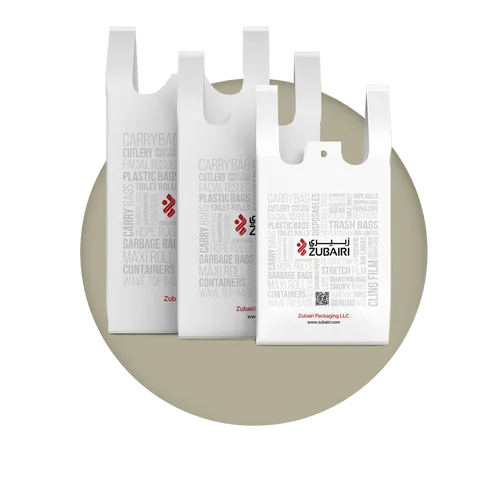The global packaging industry is undergoing a significant transformation. As environmental awareness rises and governments tighten regulations on single-use plastics, manufacturers are under increasing pressure to adopt eco-friendly practices. Ajman, a growing industrial hub in the UAE, is home to several plastic bag manufacturers who are now actively embracing sustainable production models. This shift marks a crucial step toward balancing economic development with environmental responsibility.
In this blog, we’ll explore how plastic bag manufacturers in Ajman are responding to the global call for sustainability, the methods they’re employing, and the impact these changes are having on both industry and environment.
The Growing Demand for Sustainable Packaging
Plastic bags have long been a staple in packaging due to their low cost, durability, and versatility. However, their environmental impact has raised global concerns. From polluting oceans to clogging landfills, conventional plastic bags have become a major environmental issue. This has led to a surge in demand for biodegradable, compostable, and recyclable alternatives.
In the UAE, government initiatives and public campaigns aimed at reducing plastic waste are encouraging businesses to adopt greener practices. Ajman, with its strategic location and active industrial sector, is now playing a crucial role in this transition.
A Shift in Materials: From Petro-Based to Bio-Based
One of the primary ways manufacturers in Ajman are becoming more eco-conscious is through the use of alternative raw materials. Traditional plastic bags are made from petroleum-based polymers, which are non-biodegradable and energy-intensive to produce. To address this, many factories are exploring the use of bio-based materials such as:
- Polylactic Acid (PLA): A biodegradable plastic derived from renewable sources like corn starch or sugarcane.
- Oxobiodegradable Plastics: These contain additives that help the plastic break down faster in the presence of oxygen and sunlight.
- Compostable Films: Designed to decompose under industrial composting conditions, leaving no toxic residue.
By sourcing these sustainable materials, manufacturers are able to produce bags that offer the same strength and usability while being far less harmful to the environment.
Upgrading Manufacturing Processes
Eco-friendliness doesn’t just stop at raw materials—it extends to how the bags are produced. Manufacturers in Ajman are investing in modern, energy-efficient machinery that reduces power consumption and lowers emissions during the manufacturing process.
Some factories are incorporating closed-loop systems where waste materials generated during production are collected, recycled, and reintroduced into the manufacturing cycle. This not only minimizes waste but also reduces the need for virgin material.
Additionally, water and energy-saving techniques are being implemented to further reduce the environmental footprint of manufacturing operations.
Recycling Initiatives & Waste Management
Many manufacturers in Ajman are setting up in-house recycling units to manage post-industrial waste. Instead of discarding defective or surplus products, these are collected, processed, and reused. Some factories have even partnered with waste collection companies to create a circular supply chain where used plastic bags are retrieved from retailers and reprocessed into new products.
This closed-loop recycling approach helps reduce plastic waste significantly while promoting resource efficiency—two key elements of sustainable manufacturing.
Designing for Reusability & Durability
One way to combat plastic pollution is to encourage reusability, and Ajman’s manufacturers are taking note. Instead of focusing solely on single-use bags, many are now producing durable, reusable plastic bags that can be used multiple times before disposal.
These bags are often thicker and designed with added features such as reinforced handles, gussets, or zippers. By extending the life cycle of the bag, manufacturers are reducing the overall number of plastic products entering the waste stream.
Compliance with Environmental Standards
As sustainability becomes more mainstream, regulatory frameworks are evolving to support it. In response, manufacturers in Ajman are aligning with global environmental standards and certifications such as:
- ISO 14001 (Environmental Management Systems)
- EN 13432 (Compostable Packaging Standards)
- ASTM D6400 (Compostability in the U.S.)
Meeting these standards not only ensures compliance with international guidelines but also boosts credibility in both local and global markets. Manufacturers that demonstrate a commitment to sustainability are better positioned to attract eco-conscious clients and long-term business partnerships.
Challenges on the Road to Sustainability
While the shift toward eco-friendly practices is commendable, it’s not without its challenges. Higher production costs, limited availability of biodegradable materials, and the need for new technology investments can be barriers for smaller manufacturers.
Moreover, consumer education remains a critical piece of the puzzle. Not all customers understand the value of biodegradable or compostable bags, which can slow down market demand. However, with government support and growing environmental awareness, these obstacles are gradually being addressed.
The Road Ahead: A Greener Future for Ajman’s Plastic Industry
Ajman’s plastic bag manufacturers are at a pivotal point in their evolution. By embracing eco-friendly trends, they are not only contributing to a cleaner environment but also aligning with the future of global manufacturing. The industry’s shift toward sustainability is a reflection of the broader changes happening across the UAE and the world.
With continued innovation, policy support, and market demand, Ajman is well on its way to becoming a regional leader in sustainable plastic manufacturing. What may have started as a response to regulation is fast turning into a movement powered by innovation and responsibility.
In conclusion, the eco-conscious efforts of plastic bag manufacturers in Ajman are shaping a greener tomorrow. Whether it’s through the adoption of biodegradable materials, smarter manufacturing practices, or closed-loop recycling, these changes are proof that even industries rooted in plastic can evolve to support a sustainable future.


